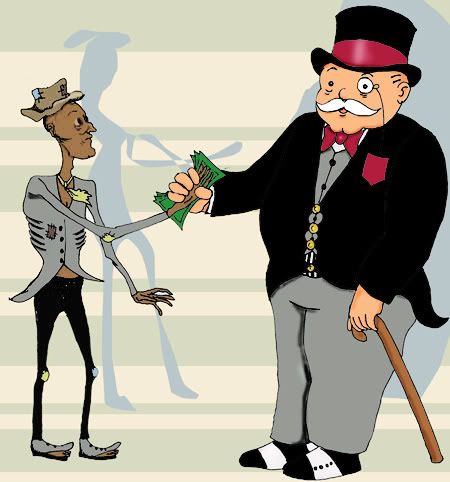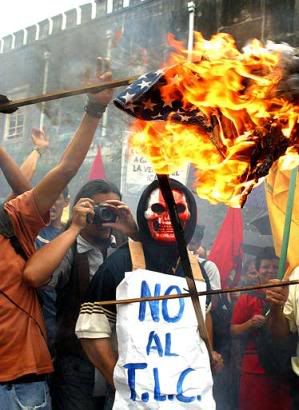Free Trade means exactly that, companies are free to do whatever they please. They are free to choose how many hours a week their employees will work, free to pay as high or low wages as they please and free from paying taxes. Because there aren't many workers in developed nations willing to work for slavery wages, these companies set out to Third World countries in search for workers to exploit.
Free Trade agreements bring jobs to these impoverished nations so their leaders embrace them and truly they will embrace anything that boosts their economy and lower the unemployment rates.
At first glance it may seem like Free Trades are beneficial to both parties, the developed country, because they get cheap labor which brings down their prices back home, and the developing nation, raises their country's GDP.
After examining the situation a little more we encounter that one country's standard of living continues to grow, meanwhile the other continues to lower, hence making the poor even poorer. International prices are set by the American dollar, which is where most of the products are sent to after they've been manufactured in free trade zones, after that, they need to be shipped, bringing the price up. So back in it's starting country, let's say Dominican Republic, the price of the product is more expensive than it's price in the United States. This is a problem because the workers in the starting country make less money than in the United States, and so not only do they get paid less at work, but also their products are worth more. It is because of things such as this that over 1 billion people in the world will go hungry next year.1
These things are only the economical perspective of it. I have decided to exclude other facts among them are child labor, income inequality, sweatshops, environmental degradation, and many other things. I leave you with a quote from Karl Marx:
"The bourgeoisie... has set up that single, unconscionable freedom -- Free Trade. In one word, for exploitation, veiled by religious and political illusions, it has substituted naked, shameless, direct, brutal exploitation."
1 State of Food Insecurity in the World, 2008 FAO."Food Security Statistics".
www.fao.org/es/ess/faostat/foodsecurity/index_en.htm




No comments:
Post a Comment